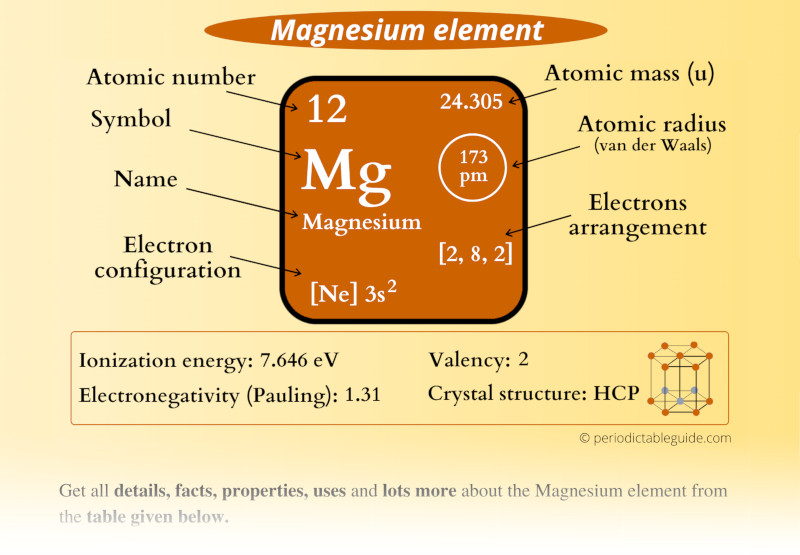Understanding Magnesium: The Essential Element In The Periodic Table
Magnesium is a crucial element in the periodic table, playing a vital role in various biological and chemical processes. As the fourth most abundant mineral in the human body, magnesium is essential for multiple physiological functions, including muscle function, nerve transmission, and energy production. In this article, we will explore the properties, applications, and significance of magnesium in our daily lives and the environment.
From its position on the periodic table to its various roles in human health and industry, magnesium is an element that deserves closer attention. Its unique characteristics make it a key player in many chemical reactions and processes, both in nature and within our bodies. Understanding magnesium's properties and importance can help us appreciate its contributions to our health and the world around us.
This comprehensive guide will delve into magnesium's characteristics, uses, and its impact on health, ensuring you gain a well-rounded understanding of this essential element. Whether you are a student, a health enthusiast, or simply curious about the periodic table, this article will provide valuable insights into magnesium.
Table of Contents
- Properties of Magnesium
- Magnesium in the Periodic Table
- Biological Importance of Magnesium
- Effects of Magnesium Deficiency
- Industrial Uses of Magnesium
- Magnesium in Food and Supplements
- Health Benefits of Magnesium
- Conclusion
Properties of Magnesium
Magnesium (Mg) is a chemical element with the atomic number 12, located in group 2 of the periodic table. It is classified as an alkaline earth metal and is known for its light weight and high strength. Here are some key properties of magnesium:
- Atomic Number: 12
- Atomic Weight: 24.305 g/mol
- Density: 1.738 g/cm³ (solid)
- Melting Point: 650 °C (1,202 °F)
- Boiling Point: 1,090 °C (1,994 °F)
- Electronegativity: 1.31 (Pauling scale)
- Appearance: Silvery-white, shiny metal
Magnesium in the Periodic Table
Magnesium is found in period 3 of the periodic table, making it part of the third row of elements. It is positioned between sodium (Na) and aluminum (Al) and is an essential element for life. The periodic table is a systematic arrangement of elements based on their atomic number, electron configuration, and recurring chemical properties. Magnesium's placement highlights its reactivity and its role as a metal.
Position and Characteristics
The position of magnesium in the periodic table reflects its properties:
- As an alkaline earth metal, magnesium has two electrons in its outer shell, making it highly reactive, especially with non-metals.
- Magnesium readily forms compounds with other elements, including oxygen and chlorine.
- It has a low density compared to other metals, making it useful in lightweight applications.
Comparison with Other Alkaline Earth Metals
Magnesium shares similarities with other alkaline earth metals, such as calcium and barium. However, it also exhibits unique properties:
- Calcium (Ca) is more abundant in the earth's crust than magnesium.
- Barium (Ba) is heavier and more reactive than magnesium.
- Magnesium is more soluble in water compared to calcium, making it essential for biological processes.
Biological Importance of Magnesium
Magnesium is vital for numerous biological functions within the human body. It plays a critical role in:
- Metabolism: Magnesium is a cofactor in more than 300 enzymatic reactions, including energy production.
- Muscle Function: It helps regulate muscle contractions and relaxations, preventing cramps.
- Nerve Transmission: Magnesium aids in transmitting signals between the brain and the body.
- DNA and RNA Synthesis: It is essential for the synthesis of nucleic acids.
Effects of Magnesium Deficiency
Despite its importance, many people do not get enough magnesium in their diet. Magnesium deficiency can lead to various health issues, including:
- Muscle cramps and spasms
- Fatigue and weakness
- Increased anxiety and depression
- Bone density loss and osteoporosis
It is essential to recognize the symptoms of magnesium deficiency and address them through dietary changes or supplementation.
Industrial Uses of Magnesium
Magnesium's lightweight and strength properties make it an essential material in various industries:
- Aerospace: Used in aircraft and spacecraft to reduce weight.
- Automotive: Employed in car manufacturing for lightweight components.
- Construction: Used in alloys for building materials.
- Electronics: Essential for producing batteries and electronic devices.
Magnesium in Food and Supplements
To maintain adequate magnesium levels, it's essential to consume magnesium-rich foods. Some excellent sources include:
- Dark leafy greens (spinach, kale)
- Nuts and seeds (almonds, pumpkin seeds)
- Whole grains (brown rice, quinoa)
- Legumes (black beans, lentils)
- Fish (salmon, mackerel)
For those who struggle to get enough magnesium from food, supplements are available in various forms, including magnesium citrate and magnesium oxide.
Health Benefits of Magnesium
In addition to preventing deficiency, adequate magnesium intake has several health benefits:
- Improved sleep quality
- Reduced risk of heart disease
- Lower blood pressure
- Enhanced athletic performance
Incorporating magnesium into your daily routine can lead to significant improvements in overall health and well-being.
Conclusion
In conclusion, magnesium is an essential element in the periodic table with profound implications for human health and industry. Its properties, biological importance, and various applications highlight the need for adequate magnesium intake in our diets. By understanding magnesium's significance, we can take proactive steps to ensure we are meeting our nutritional needs and promoting better health.
We encourage you to explore more about magnesium, consider your dietary choices, and consult with a healthcare professional if you suspect a deficiency. Your health is important, and magnesium plays a crucial role in achieving optimal well-being.
Thank you for reading! If you found this article helpful, please leave a comment below, share it with others, or check out our other articles for more valuable information.
Monique James: A Deep Dive Into The Life And Career Of A Rising Star
Photo Nazi Germany Convention: Share Photos And Free Download Options
The Ultimate Guide To Corgis: Everything You Need To Know
Mg Magnesium Chemical Element Periodic Table. Single vector

Magnesium Facts, Symbol, Discovery, Properties, Uses

Magnesium (Mg) Periodic Table (Element Information & More)